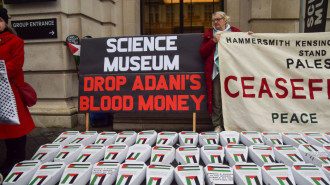
Ashkal: Tunisian detective thriller takes on the revolution

For around 654 years, Ancient Carthage was a prosperous city-nation on the Maghreb, a thriving seapower that the Roman Empire was determined to destroy.
They succeeded in 146BC and today Tunisia hosts the architectural remnants of its Carthaginian ancestors with the addition of contemporary concrete ruins left behind by the last political regime.
This is the backdrop of Tunisian writer-director Youssef Chebbi’s second feature Ashkal, a hardboiled crime drama co-written by François-Michel Allegrini and influenced by the 2011 self-immolation of Mohamed Bouazizi – the Tunisian street vendor who sparked a revolution that saw the removal of the corrupt President Zine El Abidine Ben Ali after 23 years in power.
"What becomes of a nation when a power vacuum is left and those filling it may not be up to the task of delivering the promise of change"
Grey is the formative colour saturating this defiantly urban Tunisian story. From the brutalist abandoned buildings in North Tunis’ Gardens of Carthage – that were meant to house loyal government figures of Ben Ali’s regime – to the overcast weather and the spiritless atmosphere.
Cinematographer Hazem Berrabah works well with silhouettes and depth to frame morgue scenes, conversations at Carthage’s famous mosque and other key shots that capture the rich history and urbanisation of this North African city.
Development of the Carthage area has returned after several years but at one construction site, the burnt remains of a building watchman launches a police investigation.
There is no love lost for the Tunisian police force; they had free rein to deal with brutality towards the populace during Ben Ali’s tenure but since the revolution, the Truth and Rehabilitation Commission was formed to directly deal with the systemic corruption within the law enforcement.
This creates tension between police detective Fatma (Fatma Oussaifi) and her colleagues as her father is leading the investigation.
Fatma only has Batal (Mohamed Houcine Grayaa) in her professional corner, a world-weary veteran detective conflicted by the damage he and his peers dished out during the country’s civil unrest, and the expectation to close ranks against any form of accountability.
It’s certainly refreshing to have a female cop character where nepotism rather than sexism is the main issue she’s dealing with as she and Bata lead the immolation case.
Oussaifi exhibits a quiet, steely determination in the conflicts she faces against her peers and during the increasingly mystifying investigation. The watchman’s death seems to be suicide by immolation but why use an inherently political method to die in a private space?
An increasing number of burnt bodies of blue-collar, working-class individuals, begin to pile up in the construction sites with witnesses speaking of a mysterious hooded figure close by to when and where these immolations occur. “I swear, he gave her fire with his hand,” says one suspect in the death of a maid.
|
Even with a slow-burning pace, somewhere between True Detective and Burning, an urgency in the investigation develops as political pressure attempts to close the case suspiciously quickly. Are the victims part of a cult? Is the leader supernatural? More questions are posed but Chebbi is certainly not interested in serving answers up on a platter as the story heads into an ever more chaotic third act that doesn’t quite nail the landing.
Instead, between the sparse dialogue and increasingly more volatile confrontations, the filmmaker ponders what becomes of a revolution when the flames are no longer fanned.
What becomes of a nation when a power vacuum is left and those filling it may not be up to the task of delivering the promise of change? Despite its deep historical roots, Tunisia is still trying to find its footing after centuries of colonisation, securing Independence and various uprisings against crooked powers.
When you look upon the half-built buildings in the city do you see a property on the verge of life or an abandoned structure left for dead? That’s the metaphorical conceit at the heart of Ashkal, a gritty, at times frustratingly elusive police procedural but with a strong social and political thrust to keep your interest.
Hanna Flint is a film and TV critic, writer and author of Strong Female Character with bylines at Empire, Time Out, Elle, Town & Country, the Guardian, BBC Culture and IGN.
Follow her here: @HannaFlint


